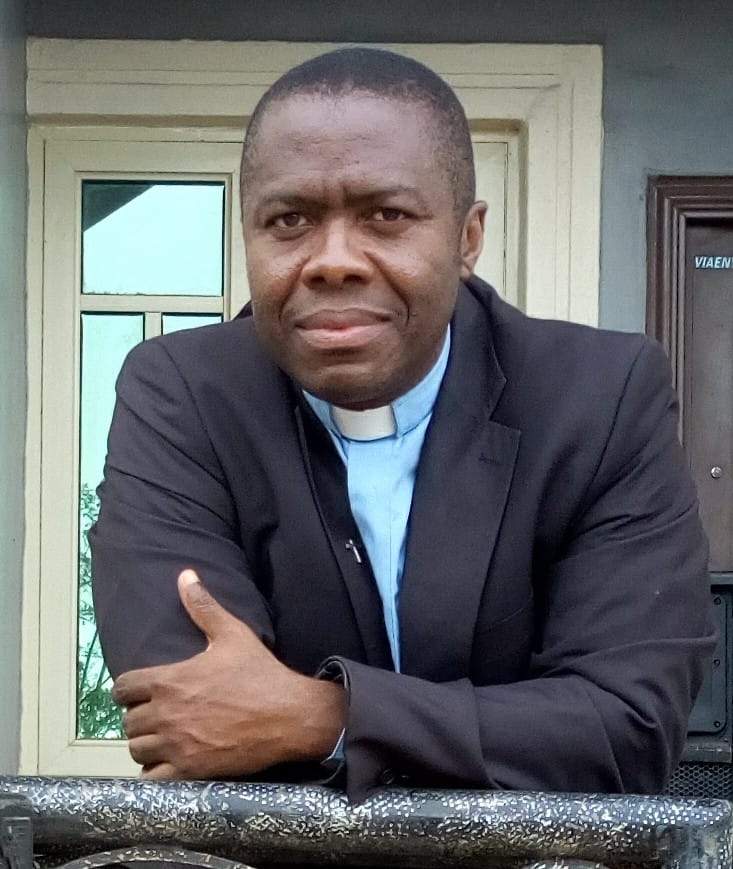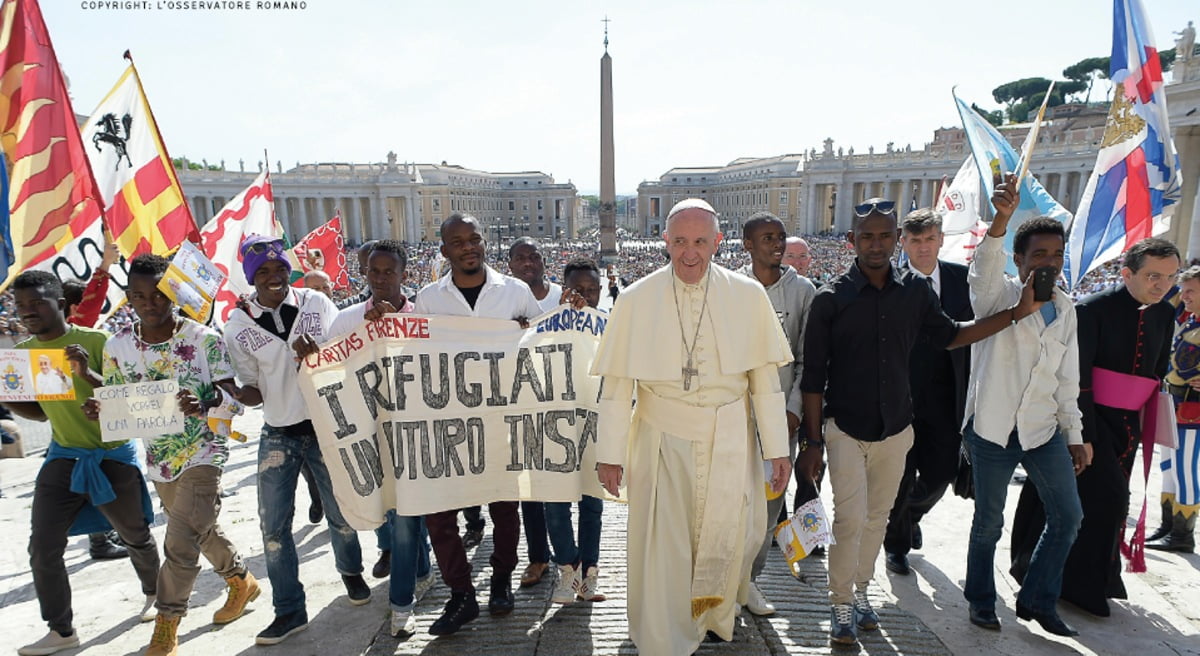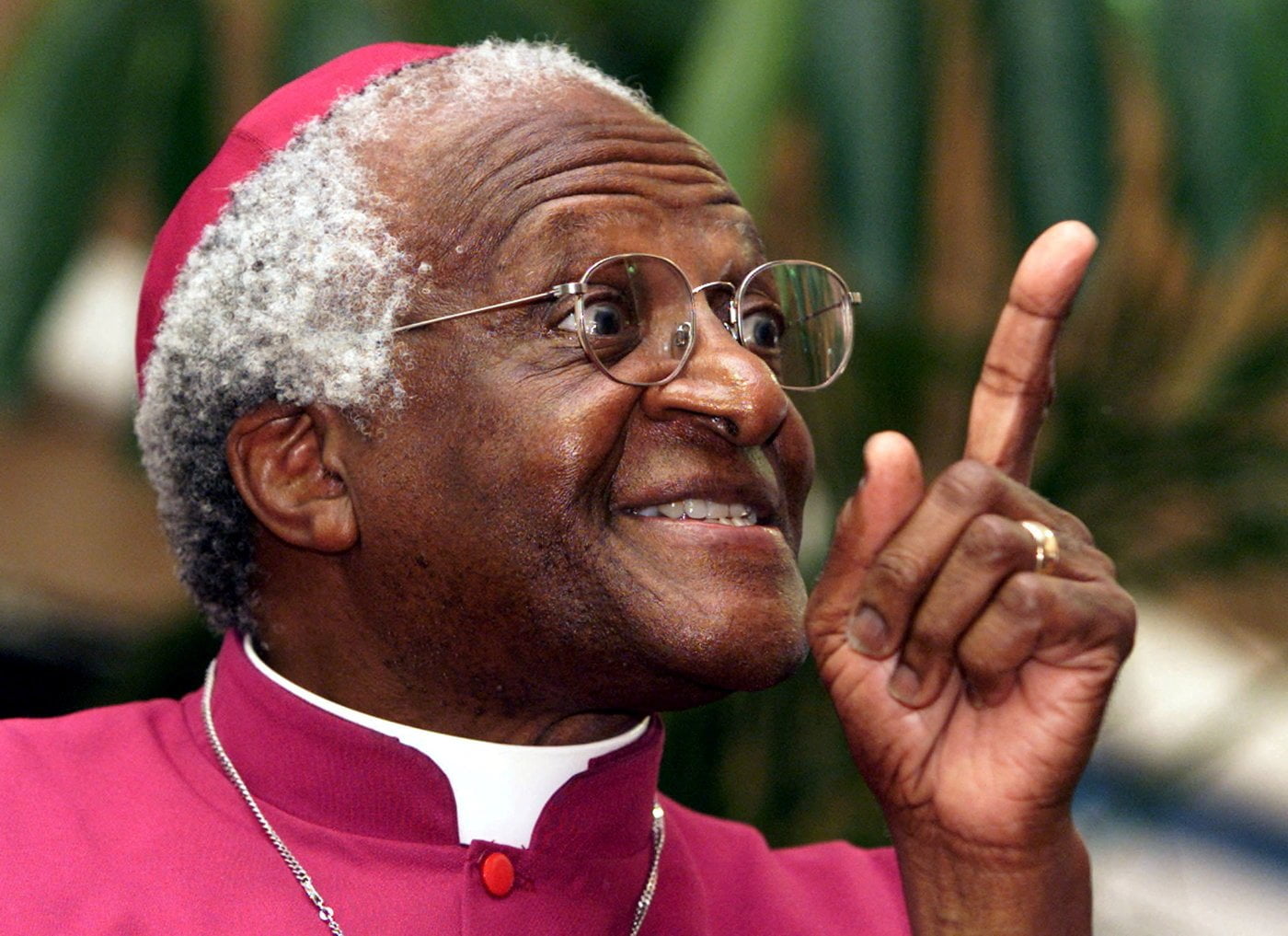8th October 2019,
By Rev; Fr; Vitalis Anaehobi.
The program facilitator was Mr. Jean-Baptist Talla, a representative of CRS in Baltimore. Thirty-one people were present in the first and second sessions of the day.
The day began with the opening session which featured addresses by the 1st Vice President of SECAM, Most Rev. Tembley Sipoka, Bishop of Tata in South Africa; and the representative of Catholic Peacebuilding Network, CPN from the USA, Fr. William Headley, Cssp.
Bishop Tembley in his speech welcomed all present and spoke on the recent xenophobic attacks in the country. He placed the causes at three points: struggle for resources, lack of entrepreneurial skills by the indigenes and the discrepancies in the treatment of crimes and criminals. He emphasized the position of SECAM on peacebuilding which consists of putting resources together to resolve common problems.
The opening session was followed by the first conference of the workshop: Reading the Signs of the Times: The challenges to Peace by Archbishop John Baptist Odama, Archbishop of Gulu, Uganda.
The presenter draws attention to a fundamental sign that he needed to share: humankind, although intended to be together, has not achieved that level. The reasons for this are:
- Man is not together with God all the time
- Because man is not with God, he also fails in his relationship of intimacy with his fellows
- Tribal affinity
- Political alliances
- Resource-based conflicts
The result is a violent misunderstanding, a man wanting and trying to be above God and above his fellows. This gives rise to the war, an old reality that is as old as humanity.
Given this context, the presenter wanted to share his past experiences in Uganda, a country with 65 tribes which before independence lived each in his own group. According to him, before the colonial era, there were tribal conflicts even to the extent of aiming to exterminate the other. This overflowed to the time of colonial independence. With the independence these ethnic conflicts gained another dimension, political conflicts, resulting from independence. The country had two political parties DP (Catholic) and UPC (Protestants). The two parties had a lot of religious elements. With independence, religious and political dimensions entered the conflicts. There was also a struggle for amassing of resources for me, my clan or my religious. In 1966 there was a violent conflict and since then the conflict has continued.
Having given this background information, the archbishop shared the experience of his engagement with the rebel groups in the country in his effort to bring peace and reconcile the warring factions.
He maintained that the Catholic Church remained with the people and with the Christians. This made the Church feel the pains of the human suffering and the Church felt that something must be done to stop this. Consequently, the Church started by calling for prayer together with other Christian religious leaders and later Muslims. It took the form of shared prayers using the Holy Books as the point of reference. Texts from the books were shared emphasising the points of unity like peace, life, nonviolence, humility, trust, and fasting. Each group was asked to bring out the good that they are promoting in their religion so as to put them together for peace in society. Finally, the political actors and the armed groups were invited and effort was made to sign a peace accord.
Lessons
- We must have peace promoters and they should know the causes of conflict and make strategies to treat them, God should not be left aside.
- The unity of partners is very important. It should not be done alone.
The evening session began with group discussion according to Regions.
The questions for discussion were as follows:
- What are the three or four key violent conflicts in your region?
- How are you, as the justice and peace commission, dealing with the most troublesome among the violent conflict you identified?
- What are the key challenges and lessons learned from your commitment to peace and justice
Report from the West African Group
- What are the three of four key violent conflicts in your region?
- Fundamentalist Religious terrorism like Boko Haram,
- Fulani herders,
- election violence,
- Chieftaincy conflict,
- land grabbing
- How are you, as the justice and peace commission, dealing with the most troublesome among the violent conflict you identified?
The most troublesome is Boko Haram because it is gradually spreading to the whole region:
- Justice and peace try to sensitive the youth not to allow themselves to be recruited by the group.
- Justice and peace are helping internally displaced people.
- RECOWA is trying to set up the National Peace Commission in all the countries of the region
- What are the key challenges and lessons learned from your commitment to peace and justice?
- The complex nature of the problem makes it difficult for the Commission to really have a serious impact on the problem. There is the feeling that the governments are not sincere and that the international arms merchants are not making the matter easy.
- There is difficulty in obtaining authentic information on the causes of the conflicts.
- It is necessary to reach out to other religious leaders in the region.
The workshop was followed by another conference on Church’s Engagement in Peace Process: Mission/Vocation by Fr. Bill Headley Cssp from CPN, USA.
The speaker spoke about the mission and vision of peace engagement, the two faces of Peace: Negative and Positive and then the different understandings of peacebuilding according to various schools of thought.
He then spoke on reconciliation. Thin Reconciliation is: “a point of peaceful coexistence is reached without meaningfully restored relationship.” (Individuals retain resentment and anger, distrust and disregard lingers, reconciliation is partial and selective, superficial coexistence regarding the structural change, leaves violations of human rights and dignity unresolved, lacks strategies to deal with future problems)
Thick reconciliation is: “rooted in the restoration of dignity for all involved and establishes mutual trust and respect.” (Individuals experience conversion and forgiveness, trust and….)
He ended his conference by talking about the reflection and Lessons from Global Church engagements and the challenges to peacebuilding.
The last session of the day was a moderated workshop on Mission/Vocation and Types of Engagement
It was a walk-around workshop whereby four topics were treated in four moving groups.
The topics are:
- Church mission informal peace process
- The Church’s mission and electoral processes
- The Church’s mission and civil society processes
- Bishops’ role in promoting the lay vocation of peacebuilders
Second day
The second day began with a conference on Engaging armed actors outside formal processes by Barr Mrs. Marie-Louise Mbida Kanse Tah, from Cameroun.
The paper concentrated on the role of the Church by trying to propose some methods for intervention in conflict situations through the Justice and Peace Commission. The presentation was done on three parts: Contribution of the Church in the prevention of conflict, promotion of peace in a time of conflict, the Church’s role in reconciliation.
The first conference was followed by another on The Church as a mediator, facilitator/ Observer of formal Processes. It was presented by Dr. Mrs. Tecla Namachanja Wanjala, former Vice-Chairperson for the Truth and Reconciliation Commission for Kenya. She shared her experiences in her work as a member of the Truth and Reconciliation Commission. She observed that for successful peacebuilding there is a need to have actors at the top, at the middle and at the grassroots. She emphasized the important place that the Church has in peacebuilding especially for the fact that the Church is found at the three levels of peace actors. She equally insisted on the need to always take into consideration the traumatic experiences of those involved in armed conflict.
The afternoon session was dedicated to the workshop. The workshop was on the specific role of different stakeholders in peacebuilding. The questions for the workshop were as follows:
What is the role of youths in peacebuilding?
What is the role of women in peacebuilding?
How do we view the armed groups in peacebuilding?
How do we integrate the victims?
Four different groups discussed the above topics, each group discussing just one of the items. To guide the discussion the following questions were added:
- What roles does your specific group play in Church peace processes?
- What are the key challenges being faced by your specific group in participating in Church peace processes?
- How can the Church strengthen your specific group’s contribution to peace processes?
Third-Day
The third day of the workshop began with a conference on Truth and reconciliation processes. It was presented by Fr. Ludovic Lado, SJ, and Director of the Jesuit Centre for Development in Chad.
He based his point of departure on positionality: a concept which states that it is always good when talking to the state from where one is talking. What point of view animates one’s talk? This is important because the interpretation of social issues has a lot to do with positionality. A point of view is always a view from a particular point. No one has the whole point of view. For this reason, every peacebuilding process must be inclusive of all those concerned with the problem.
The presenter maintained that Truth and Reconciliation is on the non-judicial side of justice. It is a restorative justice model aimed at institutional reform different from judicial justice. This is used for societies in transition: from devastating conflict to a peaceful democratic process. The major goals of Transitional Justice are:
- Halt ongoing human right abuses
- Investigate past crimes
- Identify those responsible for human right abuses etc
Having treated the various dimensions of peace and reconciliation, the Jesuit priest concluded by saying that truth, justice, forgiveness, and reconciliation are major spiritual concepts whose use in the political field leads to equivocation knowing that politics is about conquering power and keeping it. Referring to Toumai, the 7 million years old human skull discovered in Chad, he reiterated that Africa is the cradle of humanity and for this reason, Africans have the task of reconciling the world by reconciling themselves first.
His conference was followed by a group discussion on two language groups: French and English.
Group 1: Church’s role in the Transitional Justice Process
Group 2: Church collaboration with other faith communities in peace processes
The questions for discussions were the following:
- List 2 or 3 success stories you are aware of regarding your topic and highlight what makes it successful?
- What are the key challenges related to your topic?
- How can the Church strengthen her role regarding your topic?
The group discussion was followed by the last conference of the workshop on: Engaging the wider Community. It was given by Fr. Emmanuel Ntakarutimana, Director Ubuntu Centre, and Former head of Burundi’s official Human Rights Commission. He shared his experiences in conflict resolution in Burundi which led to the foundation of the Ubuntu Centre in 2002 when there were still conflicts in the country. The center concentrated on finding out the reasons that push the Burundians to kill one another. It was discovered that the problem is a lack of understanding of the value of humanity.
He explained the various activities of the center and narrated the success stories while highlighting the challenges involved in working with people in conflict.
He concluded his paper by saying that the work to be done in transforming society is enormous and this needs some technicalities which must be acquired through the formation. It also takes a lot of energy such that a synergy of actors is very important.
The last session of the workshop was a group discussion according to regions. Each region was asked to write:
Red: What they must stop doing
Yellow: What they need to pay attention to
Green: What they have to start or continue doing
The same exercise is repeated for SECAM.
The most important point of action from the groups for the regions are:
- Formation for experts, the establishment of chaplaincy for the parliament (Grand Lac)
- Being pro-active in addressing the root causes of crisis before they become violent, increase collaboration when there is crisis in a country especially when the problem could escalate to other countries of the region (ACERCA)
- Solidarity visit to the Southern Sudan Conference, (AMECEA)
- Being pro-active and capitalizing on their human resources (IMBISA)
- Reinforcing the regional Justice and Peace Commission (RECOWA)
The most important point of action recommended by the group to SECAM are:
- Strengthen and continue advocacy for peace in Africa
- That the impact of the African Cardinals should be felt during the crisis, SECAM has a post in African Union, such should be used for increased advocacy (ACERCA)
- Amplify their attention to conflict issues in the region, increased capacity building of their personnel to help them in conflict management (AMECEA)
- Set up a group of prominent people for peace and reconciliation; form a group of experts and professionals and create institutions for peace studies (IMBISA)
- SECAM should have a Peace Committee, Serious mobilization of resources; collaboration with other faith communities in Africa; finding a way of engaging the CERNA in the activities of SECAM. (RECOWA)
Closing Activity
After testimonies from two participants, there was the exchange of gifts. Each person was given a card and each picked a name from a bag where all the names of the participants have been put. Each then addresses the card to the person whose name he or she has picked.
Personal Observation:
The workshop was well organized with perfect logistics. An expert from CRS was hired to facilitate the entire session and he did it very well.
Fr. Vitalis Anaehobi
1st Deputy Secretary-General
RECOWA
12th October 2019
- RECOWA-CERAO WELCOMES TWO NEW BISHOPS - July 26, 2024
- TODAY WE ARE TAKING UP THE THIRD SEGMENT IN OUR SERIES - July 26, 2024
- CHARACTERISTICS OF GREAT LEADERS SHARED BY A USA AUTHOR - July 25, 2024







